|
|
|
Sort Order |
|
|
|
Items / Page
|
|
|
|
|
|
|
| Srl | Item |
| 1 |
ID:
124389
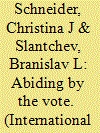

|
|
|
|
|
| Publication |
2013.
|
| Summary/Abstract |
We analyze institutional solutions to international cooperation when actors have heterogeneous preferences over the desirability of the action and split into supporters and opponents, all of whom can spend resources toward their preferred outcome. We study how actors can communicate their preferences through voting when they are not bound either by their own vote or the outcome of the collective vote. We identify two organizational types with endogenous coercive enforcement and find that neither is unambiguously preferable. Like the solutions to the traditional Prisoners' Dilemma these forms require long shadows of the future to sustain. We then show that cooperation can be sustained through a noncoercive organization where actors delegate execution to an agent. Even though this institution is costlier, it does not require any expertise by the agent and is independent of the shadow of the future, and thus is implementable when the others are not
|
|
|
|
|
|
|
|
|
|
|
|
|
|
|
|
| 2 |
ID:
116177
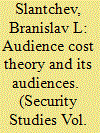

|
|
|
| 3 |
ID:
118973
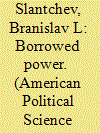

|
|
|
|
|
| Publication |
2012.
|
| Summary/Abstract |
Military expenditures are often funded by debt, and sovereign borrowers are more likely to renege on debt-service obligations if they lose a war than if they win one or if peace prevails. This makes expected debt service costlier in peace, which can affect both crisis bargaining and war termination. I analyze a complete-information model where players negotiate in the shadow of power, whose distribution depends on their mobilization levels, which can be funded partially by borrowing. I show that players can incur debts that are unsustainable in peace because the opponent is unwilling to grant the concessions necessary to service them without fighting. This explanation for war is not driven by commitment problems or informational asymmetries but by the debt-induced inefficiency of peace relative to war. War results from actions that eliminate the bargaining range rather than from inability to locate mutually acceptable deals in that range.
|
|
|
|
|
|
|
|
|
|
|
|
|
|
|
|
| 4 |
ID:
082467
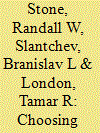

|
|
|
|
|
| Publication |
2008.
|
| Summary/Abstract |
International relations theory has borrowed important intuitions from Olson's static public-goods model (hegemonic stability) and the repeated prisoners' dilemma (theories of international cooperation), and arguments often combine implications from both models. We develop a general, repeated public-goods model. We then allow the qualitative dimensions of cooperation to emerge endogenously: agreements can have broad or narrow membership and entail deep or shallow commitments; they can be multilateral or discriminatory; they can be ad hoc or institutionalized. We find that the relationship between the distribution of power and international cooperation is complex: a large leading state forms a narrow coalition of intensive contributors, and builds institutions, while a smaller leading state forms a broader coalition that makes shallow contributions, and is more inclined to multilateralism
|
|
|
|
|
|
|
|
|
|
|
|
|
|
|
|
| 5 |
ID:
158374
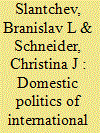

|
|
|
|
|
| Summary/Abstract |
International cooperation can fail even though governments have no distributional conflicts or incentives to free-ride, face no informational or credibility problems, and even agree on the policies that need to be implemented. Germany's refusal to cooperate with the Eurogroup members on the Greek bailout in 2010 until the crisis threatened to derail the entire Eurozone is puzzling in that regard especially because Germany is the main beneficiary of the euro. It was alleged at the time that this was a dilatory tactic designed to postpone a domestically unpopular decision until after crucial regional elections. But why would voters allow themselves to be misled like that? And why did Merkel agree to the bailout before the elections took place? To analyze how citizen preferences affect international cooperation, we develop a game-theoretic model of the four-way interaction between two governments that must coordinate a response to a crisis affecting both countries but who also must face the polls domestically with an electorate that might be uncertain whether a response is necessary. We find that, paradoxically, governments that stand to receive the greatest benefits from international cooperation face the greatest obstacles to implementing the required policies even when voters would want them to. We show how the model can rationalize Merkel's electoral strategy and why her party suffered at the polls when the strategy went off the rails.
|
|
|
|
|
|
|
|
|
|
|
|
|
|
|
|
| 6 |
ID:
097718
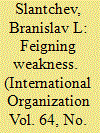

|
|
|
|
|
| Publication |
2010.
|
| Summary/Abstract |
In typical crisis bargaining models, strong actors must convince the opponent that they are not bluffing and the only way to do so is through costly signaling. However, in a war, strong actors can benefit from tactical surprise when their opponent mistakenly believes that they are weak. This creates contradictory incentives during the pre-war crisis: actors want to persuade the opponent of their strength to gain a better deal but, should war break out, they would rather have the opponent believe they are weak. I present an ultimatum crisis bargaining model that incorporates this dilemma and show that a strong actor may feign weakness during the bargaining phase. This implies that (1) absence of a costly signal is not an unambiguous revelation of weakness, (2) the problem of uncertainty is worse because the only actor with incentives to overcome it may be unwilling to do so, and (3) because of the difficulty with concealing resolve, democracies might be seriously disadvantaged in a crisis.
|
|
|
|
|
|
|
|
|
|
|
|
|
|
|
|
| 7 |
ID:
140173
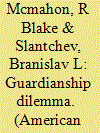

|
|
|
|
|
| Summary/Abstract |
Armed forces strong enough to protect the state also pose a threat to the state. We develop a model that distills this “Guardianship Dilemma” to its barest essentials, and show that the seemingly ironclad logic underlying our existing understanding of civil-military relations is flawed. Militaries contemplating disloyalty must worry about both successfully overthrowing the government and defeating the state’s opponent. This twin challenge induces loyalty as the state faces increasingly strong external threats, and can be managed effectively by rulers using a number of policy levers. Disloyalty can still occur when political and military elites hold divergent beliefs about the threat environment facing the state, since militaries will sometimes have less incentive to remain loyal than the ruler suspects. Consequently, it is not the need to respond to external threats that raises the risk of disloyalty—as conventional wisdom suggests—but rather uncertainty about the severity of these threats.
|
|
|
|
|
|
|
|
|
|
|
|
|
|
|
|
| 8 |
ID:
140818
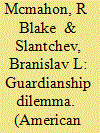

|
|
|
| 9 |
ID:
074830
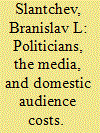

|
|
|
|
|
| Publication |
2006.
|
| Summary/Abstract |
Domestic audience costs can help leaders establish credible commitments by tying their hands. Most studies assume these costs without explaining how they arise. I link domestic audience costs to the citizens' ability to sanction the leadership for pursuing a policy they would not want if they had the same information about its quality. How can citizens learn about policy quality? I model two information transmission mechanisms: one potentially contaminated by politically motivated strategic behavior (leader and opposition), and another that is noisy and possibly biased (media). In equilibrium, audience costs can arise from strategic sources only in mixed regimes under relatively restrictive conditions, and cannot arise in autocracies or democracies. However, in democratic polities the media can play a mitigating role and does enable leaders to generate audience costs. Still, their ability to do so depends on the institutional protections guaranteeing freedom of the media from political manipulation. Domestic audience costs are not necessarily linear in regime type, as often assumed in applied research.
|
|
|
|
|
|
|
|
|
|
|
|
|
|
|
|
|
|
|
|
|